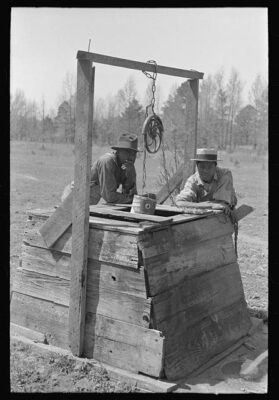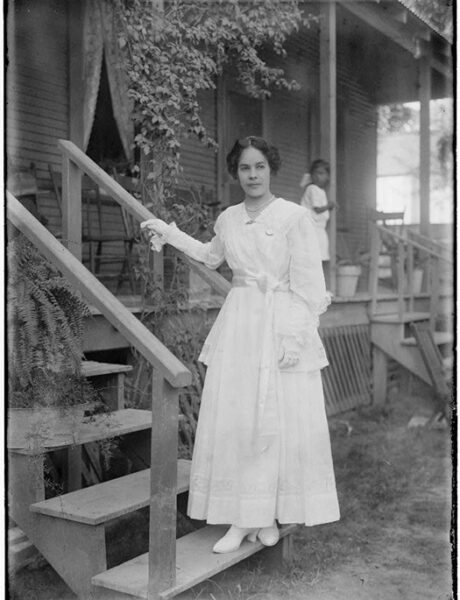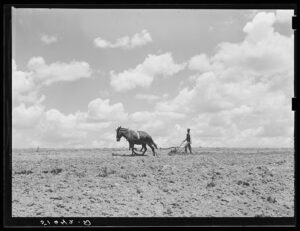THE KATRINA EFFECT
As I lectured about Okies and dust bowls and
the Great Depression, my students and I watched
CNN on a mute, wall-mounted behemoth.
I scoured images for recognizable landmarks
—dilapidated bridges, towering casinos, stretches of
man-made beach, just one wind-whipped sign
capable of geographically confirming
my homeplace. Stored cell phones numbers
cast up toward heaven like backsliders’ testimony
(with exactly the same effect). Then one-by-one,
we received proof of life,
confirmed, safety of both life and limb.
So we began
washing linens, laying out
giant bath bars, our thickest towels,
collecting clothes and toiletries, buying
whatever we lacked, while preparing
red beans and rice and impromptu crab boils.
We opened our doors and our humanity—this once,
genuinely grateful—temporarily and honestly
having forgotten why a four-hour drive
had ever been a necessary ingredient of flight.
Domesticity and close quarters took hold.
Grown folk arguing in oh-so-childish ways,
teenagers using washcloths doused with 409 to clean
white leather kicks, continually being told
what various non-mortgage-paying parties won’t eat
as they laid in supine anticipation of
my arrival from work to cook and serve
their supper. I should definitely mention children,
attitude-ridden children, surly and passive-aggressive
children with no bedtimes, and their throwback daddies
holding the den, the couch, the remote hostage.
I made a pallet in the walk-in closet and hid.
No one made any pretense about housework. But
the phone rang and rang and rang us
awake way past midnight. Our rough hellos
met by an inexorable silence, and click.
(My mother abandoned her refugees,
cashed in a forgotten voucher to Sedona.) I, too,
must admit: I just wanted those people gone.
***
REQUIEM FOR SONNY BOY
In the days before, when you were you, alive, and I had not become me,
you were the refined uncle of books, delicately sculpted, razor-tongued.
Many years escaped before I knew what no one ever said. Of course,
there were clues. Brief visits. Decorous tables. San Francisco. A photograph taken
at Fire Island. Decanters and goblets. A satin robe. Opera. Your hands
said more than your words. You are dead three years now, and I have yet to write your book.
Questions plague my house. Didn’t you witness enough of yourself in my being? I mean,
I don’t know what I mean. Genealogy, genetics. Theories fall apart. The world is flat,
it has an edge. I saw you today. Not you, but one that could have been you. A Hindu man,
beautiful. Coal skin. Impeccably dressed. Impatient with the sun. He was carrying
an umbrella. Intimations of the body: horse, crystal, rock, powder. A bitch’s brew to medicate
joy against pain. The pen will not behave, the paper is in revolt. For you,
drugs, religion, home became. Ritual, symbol, myth. Your death, a heart
attack, surprised no one. Anachronisms rarely walk the earth unscathed. AIDS
is the word my family does not say. Your car in the driveway. The driver’s door
open. One foot upon the pavement. Hands upon the wheel. Still life. This is how
you were posed. The last time I saw you, you asked for a book of poems, Rita Dove’s
Mother Love, I did not send it in time. I hope this will do.
***
BLUES MAMA
for Bessie Smith
Nip and tuck
that woebegone lip
as the pink flesh falls
slack
fueling the machine
of song.
Powerful lady
trace the sadness
tote it across the stage
called your life.
Loose yourself,
take ahold
this integrity called craft.
Lexicon of soul
lay it all down
make them know
what it feels like
to be
sprung.
Once they’re rapt
In your stirrin’
be still
don’t say
a mumbling word.
Gut-wrenching
rage
has no place
in such an earnest smile
but amidst your own
kind
there’s always a market for
a mean woman.
***
EQUANIMITY
Half-sleep, half-waked
my shutter eye clicks.
A room crowded with fringed lamps,
an antimacassared chair. A six-paneled door
grounded against thin vertical stripes.
Heavy oak dresser, a sepia-toned
lithograph of an actress. Delicate
white neck. Wicker chair
burdened with a mound of clothing.
African violets give birth
to a veritable jungle on the window ledge
as they drink polite sips of morning
light. The numbers turn slowly. Time
almost still. A rattan chest turned nightstand
holds a mason jar, filled with water, less
three small swallows. Damask and lace pillows.
Dust slanted blinds. Rows and rows
of books, most nursing cracked spines.
My breathing long as the mattress
is wide. The house settles and sighs.
The furnace’s white noise has worried
the mauve candle away to hard pink tears.
The swag of the valence forms an eye-
brow above a shaitan waterstain. We stare
at each other. Who will blink first?
I’m scared to shut my eyes. Blink
closed. Darkness transmogrifies into stone
ladies with pubic hair manicured
more neatly than the lawn. Blink open.
My hips are cradled like a motherless child
where the sagging double bed dips.
You must. I will
remember. I will remember.
I won’t forget. My breath.
This room, this calm.
***
STAY
I want to feel your daffodils.
A phrase escaped from a dream,
one eye shuts. Focus. I fumble the buttons
if the tape recorder on the floor
beside my bed. There are no other words.
But there is urgency. I must clasp
my mind around the stroke of each letter
before the emotion drifts
away. I want to feel your daffodils. I trip
free of the tub, mumbling like a lunatic.
My legs, my back.
A conniption of rivers
racing toward the floor. I find pen
but no paper. Then paper, but no ink.
Shake the pen. Curse whatever god
is handy. I want to feel
your daffodils. Each time, the words seem
like a present I don’t deserve.
More reason to believe
that this time is the last. I want
to feel your daffodils. This is what it means
to be a servant of breath.
***
TRANSFIGURATION
The berth of the distant road calls
slow your roll, but bald tires speed,
racing alongside outcroppings of wisteria,
one length behind a waxing, alabaster moon.
Pull aside, woman, pull aside.
Stopped. Body rigid, belly flat.
First she opens the car door, then
soaked linen, button by pearl button,
laying bare dew-drenched skin.
Visions of an icon, the Black Madonna.
Heat slathers over her extremities
like wax, a hot steam descends
stripping the irritating
vestiges of a dog-day drive.
Pull aside, woman, pull aside
the moist cotton between
your thighs. Sponge clean
your sacrifice to the night.
Rivulets of love roux run dry.
“I am the Black Madonna.”
She murmurs as mania leaps,
twirls between her shoulder blades.
Exhausted, she squats beneath a live oak.
With nature’s ink, she draws shadows
in the dust—a future that will never dry.
***
PUDDLEJUMPER: A.E. LINK FIELD
Beyond the oval blue
window—a bleak November.
Denuded ash trees
whisper a horizon.
Burnt matchsticks, a char of soldiers
tramping toward the vanishing point.
Surrender! they warn—shouting at the sky.
East
a defiant leap of green
between the airstrip and a concrete mind.
West
the quarter moon is talking
back to the sun.
Straight ahead is dappled
red, a harsh orange, yellow.
The air above is mottled
green, blue, a thin purple.
Everywhere
smudges pretend to be clouds.
***
I aver that I am Southern woman from Mississippi even though I am now an expat living in Singapore. When I go home for visits, I stock up on Camellia red beans, Tony Cachere seasoning, and grits. I’ve known I was a Southern every since I heard my Grand say, “That girl married for light-skin and “good” hair, now she’s trying to be surprised that her baby is stupid.”
A native of Mississippi, I completed a PhD at Binghamton University and an MA at Hollins University. My short story, “The Iron Bars,” won the 1999 Peregrine Prize. I have been a finalist for the May Swenson Award, the Journal Intro Award, the Naomi Long Madgett, the Gary Snyder Memorial Award, the Paumanok Award, as well as garnering nominations for Pushcarts. Currently, I am a Lecturer of Literature and Composition at the Center for American Education in Singapore.
-R. Flowers Rivera








